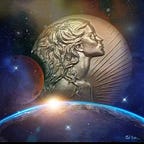The reality so far, a dream (or nightmare) so close
We’re so close to reaching
That famous happy end
Almost believing
This one’s not pretend
Let’s go on dreaming
For we know we are
So close, so close
And still so far.
Alan Irwin Menken / Stephen Laurence Schwartz
In the course of their existence and regardless of their cultural context, human beings have changed their world based on the subjective and partial vision of what they consider reality. This incorrect and incomplete vision leads us to a specialization and partialization of the phenomena that as a whole give essence to that universe, although later the human being has the opportunity to adjust it and/or align it with a more precise and complete vision.
There are even those who claim that the human being is the only being capable of creating realities just with his thoughts, being able to afford to learn how much he considers important and then unlearn it and create new realities. (Sierra Lettuce, 2014).
When our view of the planet world in relation to reality is not observable, it produces erroneous beliefs that lead to the creation of a value system that is out of step with the real dynamics and principles of the natural world. The dominant world view currently promotes our society to reach a global scale, where the scientist must be like the man from Gadara who exorcised Jesus, full of demons and, we -scientists and academics from all areas- must consolidate a single front knowledge and dedicate ourselves to breaking the selfish blind spot of specialization: the holistic or multidisciplinary scientific perspective by being as D’Artagnan, Porthos, Aramis and Athos were at the time in Dumas’s novel "All for one and one for all" (Dumas, 2013).
We must end the conception that we are an isolated individual and with a single homeland we must understand ourselves as the social being that we are that was part of a world civilization where we are all intertwined, as Neil DeGrasse Tyson said “We are all connected; To each other, biologically, to the Earth, chemically and to the rest of the Universe atomically” (DeGrasse Tyson, 2012), or even the law of 6 degrees of separation proposed by the poet Frygyes Karinthy in his story Chains in the anthology “Journey around my skull” (Karinthy, 2017) that mentions the fact that any person in the world can be connected to any other through 6 other people known in common.
We must understand that our status as human beings, as animals, we are not endogenous and isolated beings, but social animals as Aristotle would say and exogenous due to their exploratory, inquisitive and restless nature that leads him to become an Aureliano Buendía where the world first, later the cosmos is transformed into his Macondo.
(Bohm, 2008) Being members of a world civilization, both academics and scientists must fight against common fronts such as structural violence; discrimination, stratification of society; inequality in the distribution of resources and the destruction of the environment that leads to an increasingly alarming ecocide and that sadly is reaching a point of no return, this product of individualism and the greed of a few. Holistic thought being the one that could rescue us, through the interaction of various sciences, disciplines and human activities, helping us to unlearn considering ourselves the maxime autem creaturae Dei and consider that "Man has not woven the web that is life, only it is one more thread of the plot” (Chief Seattle, 1855) or maybe we are just the dream of someone else who dreamed, or the simulated reality (Bostrom, 2003).
References
Bohm, D. (2008). Totality and the Implicate Order (Sixth edition ed.). (J. Apfebäume, Trad.) Barcelona: Kairos. Retrieved on June 8, 2021
Bostrom, N. (April 28, 2003). Are you living in a computer simulation? (S. Sawyer, Ed.) The Philosophical Quarterly, 53(211), 243-255. doi:https://doi.org/10.1111/1467-9213.00309
Married, S. (June 7, 2019). Liberty magazine. Retrieved from Transforming Societies. Hegel’s triad: https://www.revistalibertalia.com/single-post/2019/06/04/triada-hegeliana-introduccion
Castro, A. (2018). The challenge of thinking differently: thought, society and nature. Buenos Aires, Argentina: Latin American Council of Social Sciences - Latin American Council of Social Sciences. Retrieved from http://biblioteca.clacso.edu.ar/clacso/se/20181101015008/Desafio_pensar_diferente.pdf
Espinosa Jaimes, A. (September 23, 2020). Digital illiteracy: one more challenge to education in a pandemic. Retrieved on February 15, 2021, from IEXE Online University: https://www.iexe.edu.mx/pagblog/analalphabetismo-digital-un-reto-mas-a-la-educacion-en-pandemia.html
Heisenberg, W., Schröedinger, E., Einstein, A., Jeans, J., Planck, M., Pauli, W., & Eddington, A. (2002). Quantum Matters: Mystical Writings of the World’s Most Famous Physicists. (K. Wilber, A. Niehaus, Edits., & P. de Casso, Trad.) Barcelona: Kairos. Retrieved on June 5, 2021
IMCO Staff. (2020). Low-achieving students why left behind and how to help them succeed via the OECD. IMCO (Public Policy Research Center). Retrieved on February 14, 2021, from https://imco.org.mx/estudiantes-de-bajo-rendimiento-por-que-se-quedan-atras-y-como-ayudarles-a-tener-exito-via -oecd/
Institute of Physics, National Autonomous University of Mexico. (s/f). Juan B. de Oyarzabal Library. Retrieved on February 11, 2021, from Heraclitus of Ephesus (535 - 484 BC): http://w2.fisica.unam.mx/bif/notices/321
Kalberg, S. (September-December 2011). The Past and Present Influence of Worldviews: Max Weber and the Neglect of a Sociological Concept. Retrieved on February 12, 2021, from Scielo: http://www.scielo.org.mx/scielo.php?script=sci_arttext&pid=S0187-01732011000300007
Martinez Miguelez, M. (2002). The emerging paradigm: towards a new theory of scientific rationality. Researchgate.net. Retrieved on February 11, 2021, from https://www.researchgate.net/publication/44487123_El_paradigma_emergente_hacia_una_nueva_teoria_de_la_racionalidad_cientifica_Miguel_Martinez_Miguelez/citation/download
Morin, E. (2008). The Lost Paradigm (Eighth Edition ed.). Barcelona: Kairos. Retrieved on June 2, 2021
Plasencia, A. (March 29, 2018). Impossible to go against the digital 'mainstream’. Retrieved on February 16, 2021, from La Tribuna: https://www.elespanol.com/invertia/disruptores-innovadores/opinion/20180329/impossible-ir-mainstream-digital/295840417_12.html
Russell, P. (2014). Science, consciousness and light. Barcelona: Kairos. Retrieved on June 4, 2021
Santiago, P., McGregor, I., Nusche, D., Ravela, P., & Toledo, D. (2012). OECD Reviews of Evaluation in Education. Mexico. OECD. Retrieved on February 13, 2021, from http://www.oecd.org/education/school/Revisiones-OCDE-evaluacion-educacion-Mexico.pdf
Sheldrake, R. (2013). The Delusion of Science (First ed.). Barcelona|: Kairos. Retrieved on June 1, 2021
Suarez, A. (August 27, 2018). The Sun of Mexico. Retrieved on February 12, 2021, from Every president launches his educational reform: https://www.elsoldemexico.com.mx/mexico/politica/cada-presidente-lanza-su-reforma-educativa-1946562.html
